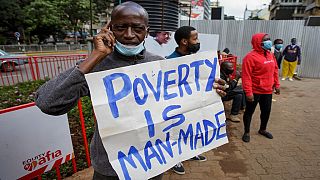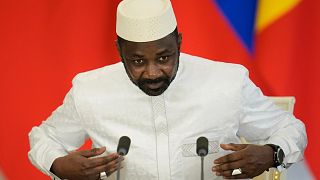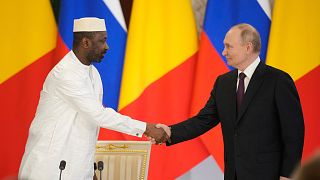Mali
Mixed feelings amongst the residents of Bamako on Tuesday following the arrest the day before of Mali’s interim President Bah Ndaw and Prime Minister Moctar Ouane in the Wet African nation's newest political crisis.
Their arrest by the military came just hours after what now appears to be an unwelcome government reshuffle in response to growing criticism.
Hamidou Digoyé a local resident is frustrated.
"We are fed up with these constant arrests by the military. They attack people, either to kill them or to arrest them and we never know why."
Another Bamako resident Mamadou Coulibaly seems to be more in favour with the recent events.
"I am not against these arrests because we support the military. It is up to the people to let them do their job."
Ousmane Togo appears to just want peace.
"Enough of the viper's tongues, let's opt for calm. Let us choose a president, let the military rule."
The detention of the officials has sparked fear of a coup d'etat only nine months after the ousting of then-president Ibrahim Boubacar Keita by the same junta on August 18, 2020.
The pair lead an interim government that was installed under the threat of regional sanctions.
The military kept the strategic portfolios it controlled during the previous administration in the reshuffle.
But two coup leaders -- ex-defence minister Sadio Camara and ex-security minister Colonel Modibo Kone -- were replaced.
Coup leaders and army officers have wielded significant influence over the government, casting doubts on a pledge to hold elections by early next year.
The reshuffle came at a time of growing political challenges in the capital Bamako and pressure to stick to the deadline for promised reforms.
- 'Grave and serious' -
Although speculation of a coup swirled around Bamako late on Monday, the city remained relatively calm.
Briefly reached by phone Monday before the line cut, Prime Minister Ouane told AFP that soldiers "came to get him".
EU leaders condemned what they called the "kidnapping" of Mali's civilian leadership, said council president Charles Michel.
"What happened was grave and serious and we are ready to consider necessary measures," he told reporters after a summit of the bloc's 27 leaders, describing events as "the kidnapping of the president and the prime minister".
Earlier, a joint statement by the United Nations, African Union, Economic Community of West African States, the European Union and the United States condemned the arrests and called for their "immediate and unconditional liberty".
Later UN Secretary-General Antonio Guterres tweeted a call for calm, and urged the "unconditional release" of the leaders.
AU head Felix Tshisekedi Tshilombo, who is the president of the Democratic Republic of the Congo, on Tuesday called for the "immediate and unconditional release" of the pair as he "strongly condemned any action that aims to destabilise Mali".
- 'Send a message' -
Young military officers ousted Keita on August 18 after weeks of protests over perceived government corruption and his handling of Mali's jihadist insurgency.
After the 15-nation West Africa bloc ECOWAS threatened sanctions, the military junta handed power to a caretaker government that pledged to reform the constitution and stage elections within 18 months.
Coup leader Assimi Goita was appointed as vice president of the caretaker administration, and the interim president, Bah Ndaw, is a retired army officer.
Many have doubted whether the military-dominated government had the will -- or the ability -- to stage reforms on a short timescale.
Among other problems, the vast nation faces a major logistical and security challenge, as swathes of territory are in the hands of jihadists.
Doubts remained despite the interim government last month pledging to hold a constitutional referendum on October 31, with elections to follow in February next year.
On May 14, amid growing anger, the government then said it would appoint a new "broad-based" cabinet.
An official at Mali's interim presidency, who requested anonymity, said the reshuffle was designed to send a message that "respect for the transition deadline remains the priority".
He also underscored the necessity of replacing the defence and security ministers.
"They are not emblematic figures of the junta," the official said, referring to the newly appointed ministers.
In an example of mounting unease, the opposition M5 movement -- which spearheaded protests against Keita in 2020 -- this month urged dissolving the interim government and demanded a "more legitimate" body.
But the M5 is divided. Two members of the Union for the Republic and Democracy party -- part of the M5 -- were appointed interim ministers Monday.












01:01
Chad’s former Prime Minister appeals to Macron after two months in detention
00:44
Mali junta chief extends army rule by five years, rules out elections
01:09
Guinea presents draft for new constitution, referendum set for September
01:00
Detained Chadian opposition leader Succes Masra ends hunger strike
01:41
UN warns of looming famine in Sudan, Gaza and 3 other global hunger hotspots
01:14
Mali: Assimi Goita could soon be president until 2030 - without an election